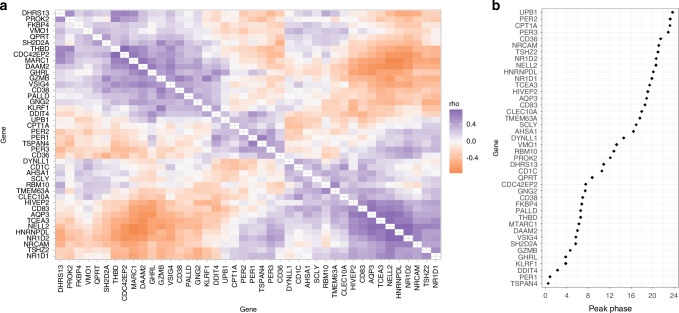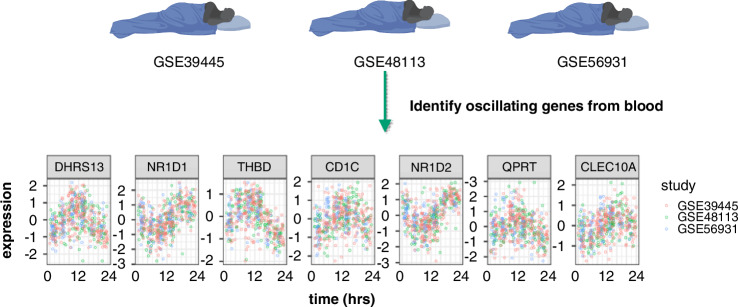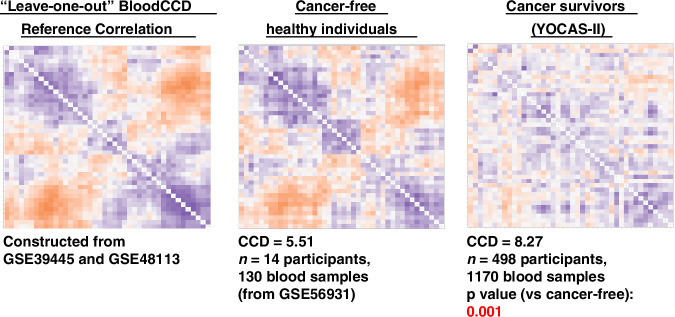Blood Clock Correlation Distance (BloodCCD) as a novel marker to detect circadian rhythm disruption in cancer survivors with insomnia.
Brian J Altman, Po-Ju Lin, Lindsey J Mattick, Elliot H Outland, Javier Bautista, Chin-Shang Li, Umang Gada, Kristina M Morris, Amelia M Knudsen-Clark, Daniel Mwangi, Rachel E DeRollo, Amber S Kleckner, Ian R Kleckner, Nikesha J Gilmore, Benjamin T Esparaz, Amarinthia Curtis, Alison Conlin, Gianni Monaco, Jacob J Hughey, Karen M Mustian
下载PDF
{"title":"Blood Clock Correlation Distance (BloodCCD) as a novel marker to detect circadian rhythm disruption in cancer survivors with insomnia.","authors":"Brian J Altman, Po-Ju Lin, Lindsey J Mattick, Elliot H Outland, Javier Bautista, Chin-Shang Li, Umang Gada, Kristina M Morris, Amelia M Knudsen-Clark, Daniel Mwangi, Rachel E DeRollo, Amber S Kleckner, Ian R Kleckner, Nikesha J Gilmore, Benjamin T Esparaz, Amarinthia Curtis, Alison Conlin, Gianni Monaco, Jacob J Hughey, Karen M Mustian","doi":"10.1038/s44276-025-00176-9","DOIUrl":null,"url":null,"abstract":"<p><strong>Background: </strong>Insomnia is a toxicity of cancer and treatment for survivors without an objective biochemical measure. Circadian rhythms are 24-h cycles that influence physiologic processes including sleep, and disrupted rhythms may contribute to insomnia. Here, we use BloodCCD to assess circadian rhythms from RNA-sequencing of blood from cancer survivors with insomnia from the YOCAS-II trial. YOCAS-II aimed to determine whether YOCAS©® yoga or cognitive behavioral therapy for insomnia (CBT-I) improved insomnia in survivors compared with a behavioral placebo. We hypothesized that circadian rhythms are disrupted in survivors, and that insomnia severity correlates with the degree of circadian disruption.</p><p><strong>Methods: </strong>BloodCCD was developed to biochemically assess circadian rhythms in blood. It was adapted from the previously published Clock Correlation Distance (CCD) and uses a correlation matrix of 42 genes known to oscillate throughout the day in blood.</p><p><strong>Results: </strong>Cancer survivors had higher (worse) BloodCCD scores, indicating disrupted circadian clock, compared to healthy individuals. Furthermore, insomnia severity correlated with worse BloodCCD, and those in the YOCAS and behavioral placebo arm showed significant correlation between BloodCCD score and insomnia.</p><p><strong>Conclusions: </strong>BloodCCD shows promise as a biomarker to biochemically detect disrupted circadian rhythms in cancer survivors, and as an indicator for insomnia severity.</p><p><strong>Clinical trial identifier: </strong>NCT02613364.</p>","PeriodicalId":519964,"journal":{"name":"BJC reports","volume":"3 1","pages":"60"},"PeriodicalIF":0.0000,"publicationDate":"2025-09-03","publicationTypes":"Journal Article","fieldsOfStudy":null,"isOpenAccess":false,"openAccessPdf":"https://www.ncbi.nlm.nih.gov/pmc/articles/PMC12408818/pdf/","citationCount":"0","resultStr":null,"platform":"Semanticscholar","paperid":null,"PeriodicalName":"BJC reports","FirstCategoryId":"1085","ListUrlMain":"https://doi.org/10.1038/s44276-025-00176-9","RegionNum":0,"RegionCategory":null,"ArticlePicture":[],"TitleCN":null,"AbstractTextCN":null,"PMCID":null,"EPubDate":"","PubModel":"","JCR":"","JCRName":"","Score":null,"Total":0}
引用次数: 0
引用
批量引用
Abstract
Background: Insomnia is a toxicity of cancer and treatment for survivors without an objective biochemical measure. Circadian rhythms are 24-h cycles that influence physiologic processes including sleep, and disrupted rhythms may contribute to insomnia. Here, we use BloodCCD to assess circadian rhythms from RNA-sequencing of blood from cancer survivors with insomnia from the YOCAS-II trial. YOCAS-II aimed to determine whether YOCAS©® yoga or cognitive behavioral therapy for insomnia (CBT-I) improved insomnia in survivors compared with a behavioral placebo. We hypothesized that circadian rhythms are disrupted in survivors, and that insomnia severity correlates with the degree of circadian disruption.
Methods: BloodCCD was developed to biochemically assess circadian rhythms in blood. It was adapted from the previously published Clock Correlation Distance (CCD) and uses a correlation matrix of 42 genes known to oscillate throughout the day in blood.
Results: Cancer survivors had higher (worse) BloodCCD scores, indicating disrupted circadian clock, compared to healthy individuals. Furthermore, insomnia severity correlated with worse BloodCCD, and those in the YOCAS and behavioral placebo arm showed significant correlation between BloodCCD score and insomnia.
Conclusions: BloodCCD shows promise as a biomarker to biochemically detect disrupted circadian rhythms in cancer survivors, and as an indicator for insomnia severity.
Clinical trial identifier: NCT02613364.
血钟相关距离(Blood Clock Correlation Distance, Blood ccd)作为一种检测癌症幸存者失眠患者昼夜节律紊乱的新标志物。
背景:失眠是一种毒性癌症和治疗幸存者没有客观的生化指标。昼夜节律是影响包括睡眠在内的生理过程的24小时周期,节律紊乱可能导致失眠。在这里,我们使用BloodCCD来评估来自YOCAS-II试验中患有失眠的癌症幸存者血液的rna测序的昼夜节律。YOCAS- ii旨在确定与行为安慰剂相比,YOCAS©®瑜伽或失眠认知行为疗法(CBT-I)是否能改善幸存者的失眠。我们假设幸存者的昼夜节律被打乱了,而失眠的严重程度与昼夜节律被打乱的程度有关。方法:采用血液ccd对血液昼夜节律进行生化评价。它改编自先前发表的时钟相关距离(CCD),并使用42个已知在血液中全天振荡的基因的相关矩阵。结果:与健康个体相比,癌症幸存者的血ccd评分更高(更差),表明生物钟被打乱。此外,失眠严重程度与较差的血ccd相关,而在YOCAS组和行为安慰剂组中,血ccd评分与失眠之间存在显著相关性。结论:血液ccd有望作为一种生物标志物,用于生物化学检测癌症幸存者的昼夜节律紊乱,并作为失眠严重程度的指标。临床试验标识符:NCT02613364。
本文章由计算机程序翻译,如有差异,请以英文原文为准。




 求助内容:
求助内容: 应助结果提醒方式:
应助结果提醒方式:


